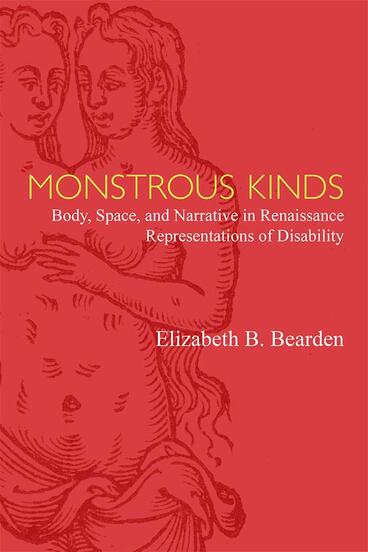Monstrous Kinds
Body, Space, and Narrative in Renaissance Representations of Disability
Elucidates how Renaissance writers used monstrosity to imagine what we now call disability
Description
Monstrous Kinds is the first book to explore textual representations of disability in the global Renaissance. Elizabeth B. Bearden contends that monstrosity, as a precursor to modern concepts of disability, has much to teach about our tendency to inscribe disability with meaning. Understanding how early modern writers approached disability not only provides more accurate genealogies of disability, but also helps nuance current aesthetic and theoretical disability formulations.
The book analyzes the cultural valences of early modern disability across a broad national and chronological span, attending to the specific bodily, spatial, and aesthetic systems that contributed to early modern literary representations of disability. The cross section of texts (including conduct books and treatises, travel writing and wonder books) is comparative, putting canonical European authors such as Castiglione into dialogue with transatlantic and Anglo-Ottoman literary exchange. Bearden questions grand narratives that convey a progression of disability from supernatural marvel to medical specimen, suggesting that, instead, these categories coexist and intersect.
Elizabeth B. Bearden is Professor of English, University of Wisconsin-Madison.
Reviews
“An excellent, timely, and necessary book that upends the problematic assumption in contemporary disability studies that norming influences didn’t exist in premodern societies. Highly interdisciplinary, Monstrous Kinds is an important contribution to both premodern and contemporary disability studies.”
—Allison P. Hobgood, Willamette University
“An innovative book that will significantly contribute to the growing body of knowledge of Renaissance disability. The variety of texts examined from different geographical areas and languages, and the in-depth analysis of the works and images, are outstanding.”
—Encarnación Juárez-Almendros, University of Notre Dame
Winner: 2017 Tobin Siebers Prize for Disability Studies in the Humanities
- Tobin Siebers Prize
"In Monstrous Kinds Bearden contributes to this critical intervention, making a strong case for what disability theorists can learn from a deeper understanding of premodern constructions of disability, and what scholars of early modern monstrosity can learn from disability studies.... Bearden's Monstrous Kinds is required reading for scholars interested in disability's past, present, and futures."
- Kristina Lucenko
—Kristina Lucenko, Disability Studies Quarterly
"Bearden, to take another instance, has shown how encounters with disabled persons in Mexican and Ottoman cultures at once establish “the ubiquity of disability” and reinforce “European understandings of the alternative capacities that sensory impairment generates.”
- Melissa E. Sanchez
—Melissa E. Sanchez, English Literary Renaissance
"In its attention to the similarities, as well as differences, in representations of disability across genre, geography, culture and historical period, Monstrous Kinds fulfills its wish to recognize that ‘we have more in common with past attitudes to disability, both good and ill, than we first might like to admit’ and exemplifies the ways in which scholarly diversity and collaboration can enrich critical disability studies."
- Lee Hansen
—Lee Hansen, Renaissance Studies
"Elizabeth Bearden's Monstrous Kinds is a much-needed, rich, interdisciplinary, and global contribution to the study of embodiment in the early modern period."
- Julia A. DeLancey
—Renaissance Quarterly
"Elizabeth B. Bearden’s Monstrous Kinds: Body, Space, and Narrative in Renaissance Representations of Disability is a valuable survey of how monstrosity and disability get deployed in conduct manuals and travel narratives in early modern Europe"
- Professor Ryan Netzley
—SEL Review
"In arguing for the presence of sophisticated, complicated ideas about disability, impairment, and social power in the early modern period, Bearden shows that disability need not be a purely modern concept: the vibrancy of disability history is there, if we look for it"
- Emily Price
—Emily Price, Supernatural Studies
News, Reviews, Interviews
Reviewed by Supernatural Studies 2/5/2021

